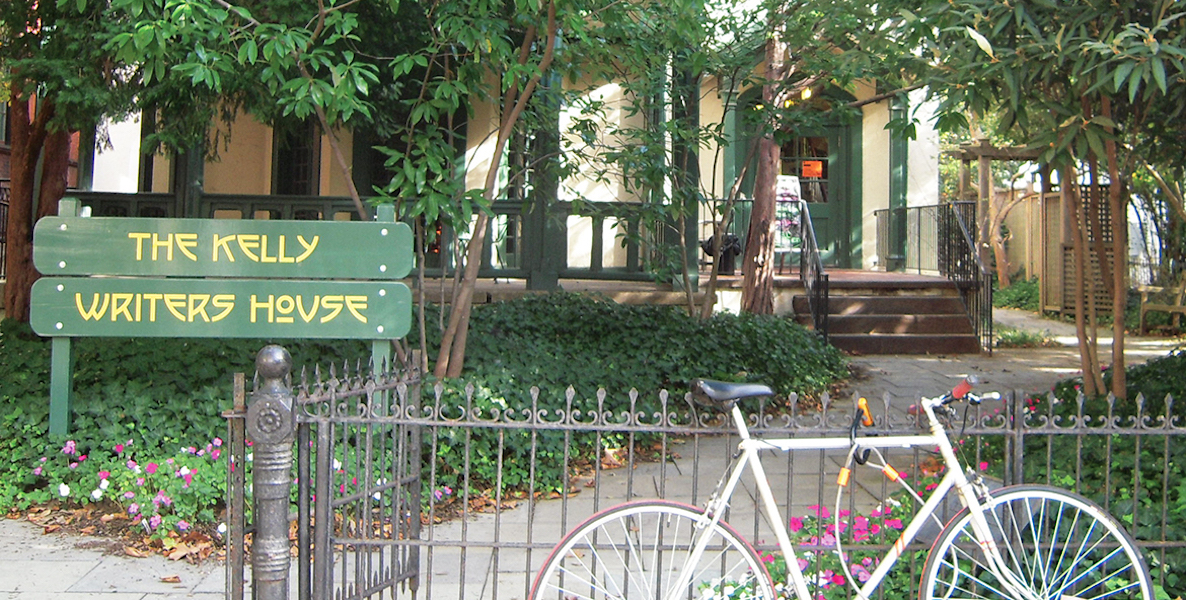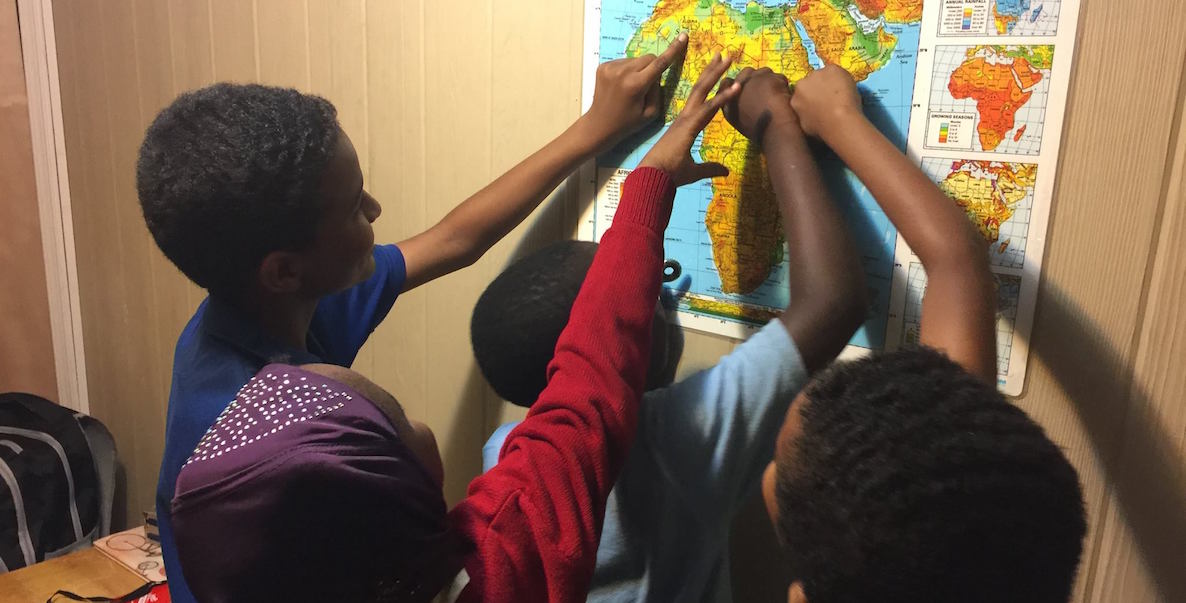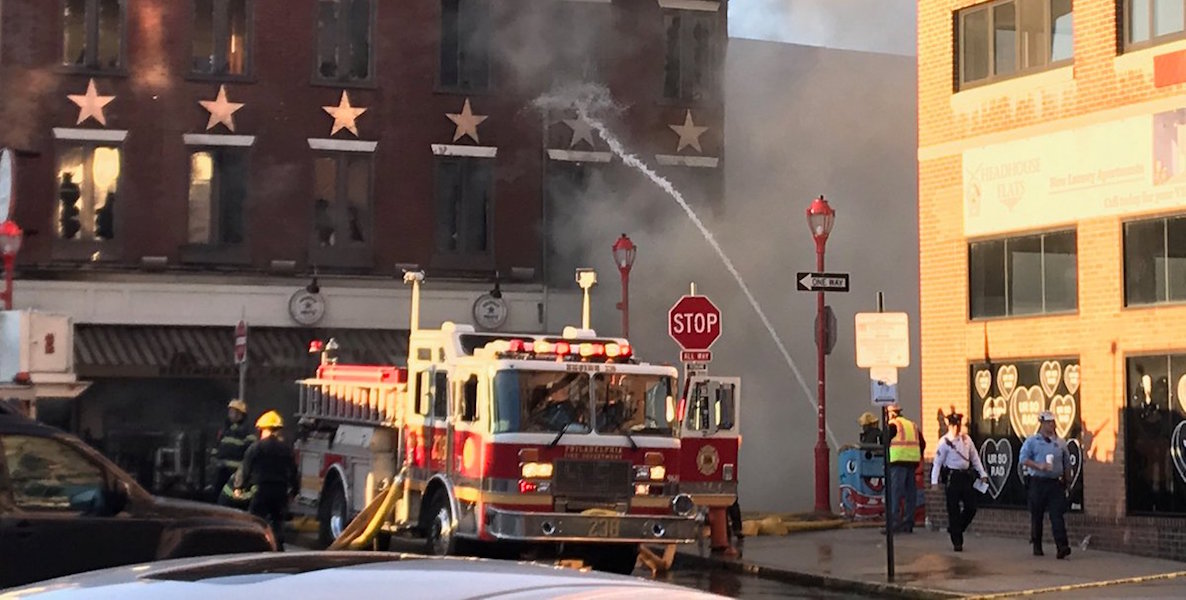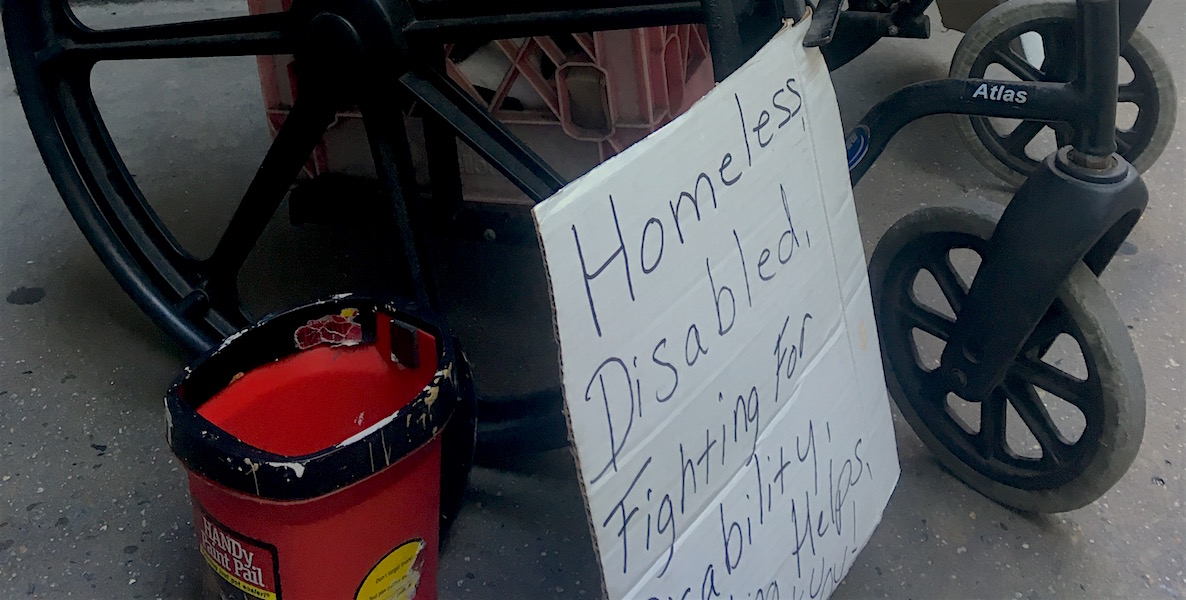Patty Rogalski grabbed a few pint glasses from a mirrored shelf behind her. It was the Tuesday before Halloween, and Bridget Foy’s was buzzing with people who all seemed to know each other. Patty greeted regulars from behind the bar, where she’d been mixing up drinks since 1999. “I would bartend all day, every day if I could,” she said. “It isn’t really work, it’s more about fun.”
She pushed her curly auburn hair out of her eyes and portioned out a pitcher of margaritas, a staple of every Taco Tuesday. It was long past happy hour, but everyone was sticking around––as they tended to do at Bridget Foy’s. The air was abuzz with chatter about everyone’s costumes for the restaurant’s annual Halloween party that Saturday. The party was the unofficial introduction to holiday season, Foy’s busiest time––its doors stayed open 365 days a year, including holidays. People who had nowhere else to go on Christmas and Thanksgiving found themselves elbow-to-elbow with other people who had nowhere else to go. Now, they went to Foy’s not because they had nowhere else to be on the holidays, but because they didn’t want to be anywhere else.
A World Series game blared from the big screen at the end of the bar. Terry Graboyes sipped her usual drink––vodka, one ice cube, a slice of lemon, and a slice of lime––from her perch on the first barstool, her seat of choice for over 10 years.
Terry frequented Foy’s since she first moved to Philly from Harrisburg in 1980, but she started eating the majority of her breakfasts, lunches and dinners at that first barstool when her son, Noah, went away to college. “I had no one to cook dinner for, no one to have dinner with,” Terry said. After selling her glass and window company five and a half years ago, she rarely went two days without stepping inside the restaurant. “Ever since I retired, people say, ‘What do you do now?’” Terry said. “And I say, ‘sitting at the first barstool at Bridget Foy’s.’”
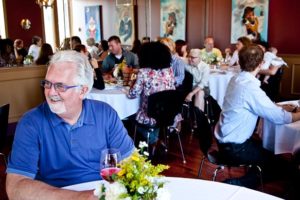
Bridget Foy’s stood on 2nd and South Street for nearly 39 years, watching its staff and rotating slew of regulars get married, divorced, have children and retire. People went there to celebrate engagements, birthdays, baby showers, the end of the workweek; the big victories, the small ones, and the days that blurred past in between.
Through each ebb and flow of life’s mercurial tide, Bridget Foy’s and the community it housed was the one constant in a sea of change. No matter when people poked their heads into the restaurant, there were certain things they could always count on: the bar would be buffed to a shine, the fish tacos would be as crisp and refreshing as they were the day before, and they’d always see a familiar friendly face as soon as they walked through that front door.
Patty usually ended her Tuesday night shifts around 11 p.m., an hour after the kitchen closed, but this night she left just after midnight. It was a balmy autumn evening, a pleasant 65 degrees, and friends of hers were enjoying the last sips of their drinks on the outdoor patio. Once they headed out, she hugged them goodbye and went about her usual end-of-night routine: flicking off the light switches, counting the money and dropping it into the safe, closing all the windows. Patty grabbed her things and exited through the front door, locking it on the way out. She hopped on her bike and pedaled home without a backward glance. She was oblivious to the smoke slowly accumulating behind the restaurant’s walls, swirling towards the ceiling.

Emmett Alexander was washing dishes when he heard the dispatch notification flash across the screen in the firehouse living area. The high-pitched sound triggered the same response in his body for the last eight years he spent fighting fires at Engine 11. He leaped from the kitchen to the watch desk and turned on the lights, laid on the bells, and hit the switch for the garage––in that order. He’d known he wanted to be a firefighter when he watched a neighbor set her sofa ablaze when he was younger. He’d gazed in awe at the rubber boots stampeding by his crouched form, inhaling the smoky scent of the firefighters’ long jackets.
Lieutenant Ryan Johnson’s eyes snapped open before he heard the shriek of the alarm. He slept on a mattress in his office with his radio on. It blared reports of alerts and arrests happening in Philadelphia south of Lehigh Avenue, the dividing line between the city’s two fire districts, so his eyes never fully shut any night he spent on duty. It showed––his eyes were rimmed with circles so dark it looked like he’d drawn them on with kohl. He flew down the staircase toward the truck, where Alexander stood waiting for him.
“Like almost every other story in my life, without Bridget Foy’s I never would have met Felicia, and I don’t know what would have happened to her,” Terry said. “My life and hers certainly wouldn’t have been this good.”
“Second and South, for a fire.” The words were barely out before the truck peeled out of the station, the wail of its siren puncturing the silence of the night.
Johnson rolled down his window as they sped four blocks down South Street, a straight shot from their station on 6th. He breathed in the crisp autumn air, not detecting any traces of smoke. He relaxed a little. It’s probably a kitchen fire, he thought to himself.
The truck screeched to a stop in front of Bridget Foy’s at 1:19 a.m., one minute after Alexander pulled the alarm. A ladder truck arrived on its heels. A few wisps of smoke surrounded the four-story restaurant, a gray haze lazily lingering around its perimeter. Nothing crazy. Johnson nodded to himself––his prediction was likely right.
The men filed out, sliding their oxygen masks over their noses and mouths. They forced the South Street entrance open and fed the line as Johnson followed Alexander through the doors. A wall of dense black smoke punched them in their chests––smoke that thick should have been perceived outside, from blocks away. Johnson shook his head and heaved in a deep breath of compressed air from his oxygen pack. He waved his gloved hand in front of his face and looked straight ahead. He couldn’t see it.

John Foy worked every job there was in the hospitality industry––busboy, waiter, bartender, line cook––before purchasing a crumbling building on 2nd and South. It was 1978, and he was working as a manager of a restaurant down the street when he overheard an old regular muttering about how he was going to throw out his building’s current tenants, as they were not paying rent. Foy approached the bar and casually asked how much the rent was.
“$1,250 a month,” the man grumbled to his drink.
Foy scratched his dark beard. “I’ll take it!”
There was a North Philly, a South Philly, and even a West Philly, so some locals started calling the area East Philly––and East Philly Cafe was born. A pretty cocktail waitress caught Foy’s eye one day, and not long after, Bernadette agreed to marry him. They had their first child in 1982 and brought her straight to the restaurant from Pennsylvania Hospital. Gazing down at their blue-eyed baby girl, the Foys knew Bridget would grow up sneaking bites from the kitchen and sitting at the bar before she could even reach the counter. They erected a new sign above the doorway: “Bridget Foy’s.”
As the years flew past, Bridget Foy’s watched neighboring restaurants close their doors not long after first flinging them open. Foy’s escaped a similar fate by embracing the neighborhood’s changing tastes. It boasted an impressive list of firsts: Philly’s first outdoor café, down on the sidewalk, before it was elevated and fenced off years later; the first Philly restaurant to have Guinness on tap, after John tried it on a trip to Ireland; the first in Philly to use the English pint glass.
From student writersRead More
John oversaw each change, his beard growing white; his daughter shifting from busser to dishwasher to hostess to manager; propping her kids, Felix and Ruby, up at the bar just as he’d done to Bridget, their tiny feet dangling off the barstools. His life and the restaurant were one and the same.
John was asleep next to his wife at 1:30 a.m. Wednesday morning when he heard his cell phone chirp. He opened the text message from a neighbor, and his heart dropped into his stomach. “Oh my god. The restaurant’s on fire,” he said out loud, trying to believe it.
Bernadette was sleeping soundly. John didn’t try to wake her. He shoved on a pair of shoes and burst out of his home on 2nd and Fitzwater, running up 2nd Street until he was stopped by the police a block and a half away. He glimpsed a hook and ladder stretching to the third floor and knew it was over. He winced as firefighters shattered each paned window he’d painstakingly installed so customers could look out on South Street as they dined. The orange flames danced in his pupils as he watched the past 39 years of his life surrender to the roaring fire, engulfed in a black cloud of smoke.

Red lights flashed across Johnson’s field of vision, his oxygen tank’s first warning that he was low on air. He blinked them away. The men had been shuffling around the first floor of the restaurant for over 30 minutes, and they hadn’t made any progress. The smoke was black as night; the fire had to be nearby. But it was odd––they felt no heat. They saw no orange glow of flames, felt no uptick in temperature. The men held the hose line with one hand, feeling hard surfaces they thought could be walls with the other, searching for any signs of warmth between the overturned wooden tables and chairs––carved with the restaurant’s signature star-shaped cutouts––and finding none.
What they didn’t know was that the tiled floor was set in a thick layer of poured concrete. Flames licked the floor beneath their feet, roaring to life in the basement prep kitchen that ran the length of the building. But the undulating waves of heat were completely insulated by that slab of concrete. Firemen dropped to their knees and patted the floor, their fingertips seeking heat but finding coolness. The flames screamed beneath their oblivious palms.
Alexander pushed deeper into the restaurant, blindly pointing the hose in front of him. He edged forward in the darkness and tripped over something unknown, still holding the hose. He got back up and pressed onward. He’d fallen over a flight of stairs near the kitchen––the only object hot to touch in the whole first floor. There was a ruptured gas line beneath the steps, feeding the fire below. The adrenaline coursing through his veins made him blind to the heat of the steps, and the sting of the second-degree burn below his left knee.
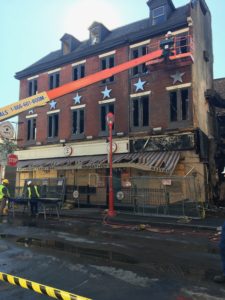
The mask on Johnson’s face shrieked and shook with a loud rumble, the second and third signs that his air supply was dwindling. Each self-contained breathing apparatus contained forty-five minutes of compressed ambient air, but each firefighter blew through it at varying speeds. Johnson was heavyset and gasped through the supply faster than some of the younger men, who were shorter and all lean muscle.
The mask suctioned to Johnson’s cheeks, the fourth and final signal that he was in trouble. His tank was completely sucked dry of air. Johnson dropped to his knees and pulled up his mask. Smoke rises, and there’s usually some oxygen towards the ground. But this fire was different. The smoke packed the room completely, as dense toward the ceiling as it was toward the floor. It left no fresh air to be inhaled. Johnson felt for the rubber coil of the hose in an attempt to follow it out to the truck. But he found himself crawling in circles––he didn’t know it, but the hose line was tangled around the bar. His breaths grew shallow.
Captain Theophillus Watkins of Ladder 2 felt Johnson’s hand slip from his arm. He called for a mayday and men grabbed Johnson’s sleeve, rushing him out of the darkness.
Johnson panted as the medics took his vitals and slipped a tube of pure oxygen beneath his nostrils. They prepared the ambulance to take him to the hospital to be treated for smoke inhalation, but Johnson shook his head. He couldn’t leave his platoon––that’s just not something he did, especially not as a lieutenant. “I didn’t want the fire to beat me,” he later said. He grabbed his helmet and empty oxygen pack and walked back to the smoke and the flames.

Every Saturday morning, Terry arrived at Foy’s at 10 a.m. to eat breakfast at her table––table 35, right behind the hostess stand. In 2010, 21-year-old Felicia Puff worked as a hostess at Foy’s, when she wasn’t in classes at the University of the Arts. They became close friends, with Terry soon calling Felicia by her last name, or its endearing modification, “Puffy.”
“Through no fault on her own, she fell on some tough luck and didn’t graduate, kind of became homeless,” Terry said. “She came to live with me.”
Felicia stayed with Terry at her house on 7th and Lombard on and off for two years, during which she worked part-time jobs and finally obtained her degree. She met her fiancée, Chris, on Tinder, while sitting on the couch in Terry’s den, a giant grin stretched across her face as she typed furiously.
Chris got down on one knee the day before Thanksgiving. Terry gave Chris the half carat marquise-cut diamond from her own engagement ring––“my kids didn’t want it because they said marquise were out of style”––to give to Felicia. “I love her as much as if I would have given birth to her,” said Terry.
Chris designed Terry’s stone into a new ring for Felicia, nestling it in strands of rose gold surrounded with sea foam opals. “Like almost every other story in my life, without Bridget Foy’s I never would have met Felicia, and I don’t know what would have happened to her,” Terry said. “My life and hers certainly wouldn’t have been this good.”

Inside the building, plaster rained down from the ceiling. Nervous that it would collapse, the fire commissioner called for the switch to an exterior attack. Firemen surrounded the building on all sides and aimed streams of white, frothing water into every smashed window.
It was a game of hide-and-seek. The orange flames flickered through the shattered glass; the firemen shot torrents of water in their direction, trying desperately to douse the flames before they darted away. Alexander grabbed one of the red tables from the outdoor deck. He tilted it on its side and laid the tip of the hose on the surface to angle up into the building.
See Philly's Fire Safety Checklist for RestaurantsDo Something
They’d switched to the larger 2-½ inch hose, better suited for spraying water into large, open areas. The line was normally manned by two people, and even with the table as reinforcement Alexander found it difficult to catch his breath. He hadn’t slept since the night before, and he was tired. He struggled to maintain control over the powerful arc of water, 1,500 gallons gushing out of the hose each minute. “I think I used every muscle in my body,” Alexander said. “I was hurt.”
Johnson was the first to spot Alexander wobbling on his feet. He approached him and noticed a faraway look in his eyes. Alexander couldn’t tell him where he was or what he was doing. “Someone else grab this line,” Johnson shouted. He half-walked, half-dragged Alexander to the medic, where he was treated for heat exhaustion. The ambulance doors slammed shut and raced toward Jefferson Hospital. Alexander finally started to feel a strong stinging sensation on his left shin.

Patty’s phone vibrated atop her nightstand. She had over 40 missed calls and texts from friends concerned she hadn’t left the restaurant. “I didn’t believe it at first,” Patty said. “I thought it was a nightmare.” She grabbed her dog and drove to Foy’s around 4:30 a.m.
She didn’t know where to look first––at the wild flames illuminating the night sky, the smoke shooting from the roof like an angry teakettle, the yellow hose lines snaking around the restaurant like clumps of spaghetti. Her vision blurred with tears. I shouldn’t be here, she thought. Patty drove home, tried to sleep, and dressed for her day job in accounting at the Municipal Services Building across from City Hall. She biked back to Foy’s on her way to work but found she couldn’t continue on to Broad Street. She joined the large cluster of staff and regulars crying and embracing.
“It was the saddest day,” she said. “It felt like we were watching an explosion.”

Johnson wiped a mixture of soot and sweat from his brow. The sun was coming up over the horizon, its pale yellow rays peeking through the gray cloud hovering around the building. Over the course of the morning, 37 pieces of equipment and 110 firemen had arrived on the scene. Alexander was one of three firefighters rushed to the hospital; the other two went for a broken hand and a knee injury. Two dogs from the neighboring pet store, Doggie Style, died from smoke inhalation.
The fire was placed under control at 3:51 a.m., but a few stubborn flames refused to be snuffed out until well after 8 a.m. Yellow sparks continued to flare toward the sky, shooting up from the one-floor extension that housed the kitchen on the right side of the building. It was burnt to a crisp. The red and white striped awning that hung over the deck was torn to shreds.
The firemen from Engine 11 exchanged radios with their relief platoon. Their truck was still hooked up to the hydrant, so they walked back up South Street toward the station. Johnson paused as they neared the restaurant. He wanted to see what, if anything, the fire that almost beat him had left behind. He peered through a gaping hole that used to house a window.
“I feel like I’ve gone through the stages of grief, as if someone has died,” Bridget later said. “It wasn’t a person, but it kinda was.” She looked down at her lap. “It kinda was.”
The cement floor had caved in to the basement, and the intricate bronze ceiling collapsed with it. Legs of chairs were visible in the rubble. Johnson squinted. Most of the floor had folded in around it, but the entire wooden bar was still standing. Several bottles of liquor remained upright on its shelves, not a single drop spilled during the commotion.
The fire at Bridget Foy’s was “deceptively bad,” due to the building’s insulated floors and confusing layout, but it wasn’t the worst Johnson had ever seen. Yet news anchors from all the local stations stood around the fenced-off building. Hundreds of residents hovered around the block and didn’t show any signs of leaving.
“I’ve seen churches burn down, I’ve been to school fires where schools have burned down, I’ve seen buildings burn down where 200 people have been displaced,” Johnson later said. “Usually we fight a fire and that’s it, go home, next day you fight another one. This one, it seems to be sticking.”

John and Bernadette called their daughter repeatedly as the fire raged throughout the morning, but she never picked up. Bridget had always been a light sleeper, but she was feeling under the weather Tuesday night. She took a dose of Nyquil and fell asleep in her daughter’s room until she woke to her husband, Paul, shaking her shoulder.
Bridget sprinted the six blocks from her house to the smoking building at 8:30 a.m. When she was younger she’d go to the restaurant before going home from school; over the summers, she worked as a busser, dishwasher, and craft cook. Upon graduating high school, she studied restaurant management at Johnson and Wales and spent a few years working for more corporate restaurants in New York City. Those years were the only ones she ever spent away from her namesake. “I always knew I’d end up coming back,” she said.
Bridget watched the firefighters extinguish the final flames through glazed eyes. People hugged her and told her how much her family and the restaurant meant to them. She nodded, not saying much back. “I feel like I’ve gone through the stages of grief, as if someone has died,” she later said. “It wasn’t a person, but it kinda was.” She looked down at her lap. “It kinda was.”
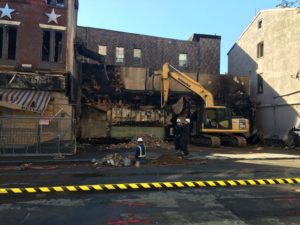
Terry stood behind Bridget with Mingo Reynolds, another longtime patron. The fires had stopped, and the excavation started. Men in hard hats drove bulldozers into the deformed kitchen. Yellow claws dug into the restaurant, scooping out bits of kitchen equipment and floor tile and releasing it onto South Street.
Tears started to roll down Mingo’s cheeks. “It was more than just a watering hole, it was really like a member of the family,” she said. “So many other spots have come and gone, but that place for every business in the area is sort of the holy grail. And I think honestly it has come down to the warmth that you feel when you’re there.”
In April of 2015, Mingo’s partner, Cheryl, was laid off from her job with the Garces Group. Bridget stepped in and offered Cheryl a weekend hostess job until she found work elsewhere. Mingo had just held a fundraiser there two weeks earlier for Back on My Feet, an organization she was raising money for ahead of running the New York City Marathon. “Pretty much every time I was doing a fundraiser that wasn’t there, Bridget was first in line to give me a gift card to the restaurant to raffle off,” she said. “They’re all very, very generous people.”
The bulldozer ripped through the kitchen and swiveled back to face the crowd, dumping another pile of destruction before their solemn expressions. The machine beeped as it inched toward the red and white striped awning that spanned the length of the outdoor deck.
“Watching this, next to the deaths of my mother and father, is the hardest thing I have ever seen,” Terry told a news anchor from Fox 29. Her voice, grizzled from years of smoking, dropped even lower than usual.
“When they went to the awning, we just almost felt physical pain. All I wanted to do was run and cover Bridget’s eyes,” Mingo said, tears pooling beneath her glasses. She let out a sob, her voice catching in her throat. “If this is this hard for me, I cannot imagine what that feels like to her.”
John Foy stood by his restaurant until well after the sun dipped back down below the horizon. “Our clubhouse is gone,” is all he repeated, over and over again. A reporter approached him. “What do you need most right now?” she asked. He searched her face, his eyebrows so knit in distress they practically touched. “Thirty jobs for my employees,” he said finally.

Kevin O’Brien downed a shot of Jameson, the clear brown liquid flowing down his throat like a viscous spoonful of cough medicine. The former longtime waiter at Bridget Foy’s sat in an Irish pub in Center City. He’d just come from a job interview to work as a bellhop in the Rittenhouse Hotel.
Kevin wiped his mouth on the too-long sleeve of his blazer, taking care to not mess up his meticulously curved handlebar mustache. He’d had two beers and one shot before this second round, and his cheeks were turning ruddy. Kevin started waiting tables at Foy’s in 2004, and his playful and sometimes brash sense of humor quickly made him their best server. The waitresses started calling him “Uncle Kevy” a few years in, and the name stuck. “Met so many people there, man, cultivated so many great relationships,” he said, leaning on the bar top in front of him. He sighed. “I’m going to miss that place.”
“Our clubhouse is gone,” John repeated, over and over again. A reporter approached him. “What do you need most right now?” she asked. He searched her face, his eyebrows so knit in distress they practically touched. “Thirty jobs for my employees,” he said finally.
Kevin shot out of bed when he first heard about the fire. He tossed and turned until dawn and headed to the restaurant around 9 a.m. He tapped a regular on the shoulder and quipped, “I hear they’re giving out well-done steaks up there,” gesturing to the smoldering rooftop. He chuckled, and then his face grew serious. “For all the jokes I was giving out…that was tough to look at,” he said.
“Every other regular was crying more than I was,” he said. “I was just like, guys, get it together, it’s a bar, I know. You will find another place, I will not find another place like this to work.” The Foys embraced Kevin’s quirks in a way no other employer ever had. Bridget Foy’s was the first place he felt he could actually be himself at work. “They gave me health insurance,” he said. “What food server at a family restaurant do you know that has health insurance?”
Watch the Bridget Foy's fundraiser for former employees Video
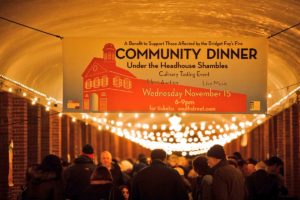
John and Bridget focused on finding their servers, busboys, hostesses and bartenders jobs at local businesses. When Bridget heard Kevin was interviewing at the Rittenhouse, she posted on Facebook and tagged the hotel: “Please consider hiring Kevin O’Brien (mustache man) for the open bellman position! He is reliable, hardworking, loyal and funny. We promise you won’t regret it!” The post garnered 147 likes and several comments echoing Bridget’s words. John wrote a heartfelt letter of recommendation for the position. Kevin cried when he read it.
“They gave me everything they could,” he said, his eyes growing misty. “I’m gonna miss it.” His voice cracked. “I don’t think I’ll ever work in a place like that again.” He laughed sadly and raised his beer.

Tattered edges of the circus-striped awning fluttered in the wind. The windows were boarded up with wooden planks; strips of plywood were nailed over the main doorway to prevent anyone from wandering in. The extension that housed the kitchen was completely gouged out, an indent forming in its absence. A silver fence surrounded the restaurant, but the sidewalk was open again. A cheerful orange sign advertising the Halloween party hung to the right of the doorway, its cartoon witches and ghosts unaware that the annual bash never happened.
The fire on October 25 was unofficially deemed an electric fire, but the investigation for its specific cause was still underway. The Foys were waiting for their building to be released back to them. Until then, they couldn’t touch the ripped awning or outdated poster. Bridget avoided the restaurant when possible. “I hate the way it looks right now,” she said. She and her father had started working on plans to rebuild Bridget Foy’s from the ground up. Demo finally began several weeks later, and Bridget said she hopes to reopen by next winter.
“It seems like everything moves slower than you want it to,” she said.
John Foy shouldered the responsibility for returning to the site of the fire nearly every day since it occurred to meet with architects, contractors, and representatives from the Department of Licenses and Inspections. “I’m by the building every day, five or six times,” he said. John tried to avoid it when he could, though it was virtually impossible, as he lived two blocks away. He made an effort to lead Bernadette along a circuitous path when they’d gone out for dinner or a glass of wine, so that she didn’t have to see the wreckage.
“It went from tears and gnashing of teeth to acceptance,” he said. “You take on a soldier’s mindset––hey, we’re going to move forward, we’re going to fix this.”

Terry sat at a table in the South Street Diner, half a block away from where Bridget Foy’s used to stand. She toyed with the plastic canisters of cream on the center of a table and looked longingly at the empty barstools lining the diner’s counter a few feet away. Terry looked small in the vinyl booth. “I’m more of a counter person,” she said, thinking about her barstool at Foy’s.
“My entire life revolved around that place. I didn’t have another life. I don’t have a job, a hobby,” Terry said. “That was my hobby.”
“It was more than just a watering hole, it was really like a member of the family,” Mingo said. “So many other spots have come and gone, but that place for every business in the area is sort of the holy grail. And I think honestly it has come down to the warmth that you feel when you’re there.”
Her plate of scrambled eggs and bacon with a plain bagel arrived. “So I’m feeling a little homeless, especially going into the holidays,” she said, taking a bite out of the buttered bagel.
Most everything in Terry’s life happened within the restaurant’s doors: her son’s rehearsal dinner, her fundraisers, her 60th birthday party, her company’s holiday parties, her Passover Seders. It somehow even said on her Facebook page that she worked at Bridget Foy’s. Terry became part of the Foy family––she attended Bridget’s wedding and spent every Christmas at her house; attended both of her kids’ christenings, babysat for them regularly, and introduced them to the theater. “I haven’t seen the kids in so long,” she said sadly. “I don’t want them to forget me.”’
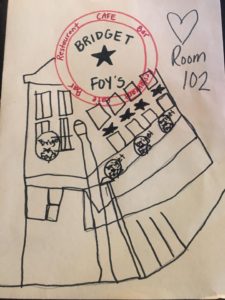
Terry lived alone, and when she was sick with breast cancer she was uncertain who would care for her after surgery. Mingo and Cheryl insisted on staying with her. “They wrapped my bandages and went to the doctor’s appointments with me,” Terry said. “It’s family.”
She’d recently seen John, who showed her the sketches the architect had drawn up for the rebuild. “I’m really hopeful that they’ll create something that will be as important to another generation as it was to mine,” Terry said, leaning back against the booth. “Maybe people who have never been to the original Bridget Foy’s, or East Philly Cafe, will find this place and will make lifelong friendships.”
She unfolded a few crisp bills and set them atop the check. “What existed there is what they call a snapshot in time. I don’t think they can ever recreate, ‘cause you really can’t go back there.”
Terry walked out of the diner into the chilly November air, pulling her sweater closer to her chest. She stepped into her gold Jeep, buckled her seatbelt and pulled the car around to 2nd and South.
The car eased to a stop in front of what used to be Bridget Foy’s. Terry put the car in park. “There she is,” she said quietly. She twisted in her seat and faced the remains head-on, her eyes searching for signs of comfort in its hollow structure.
She shuddered, as if she was in pain. “I spent more than half of my life there.” She sighed again and sped away, fixing her eyes on the road ahead instead of the skeleton of an old friend growing smaller and smaller in her rearview mirror.
Photo: Katherine Scott via 6abc News


